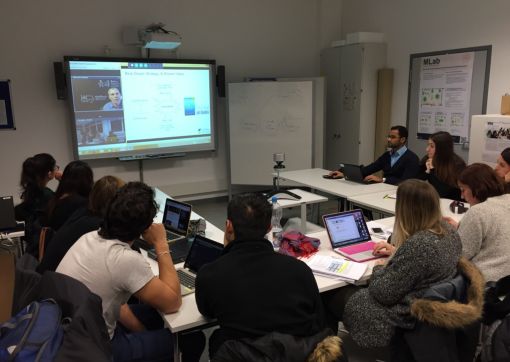How can new products be developed that benefit both businesses and society? Students of the DAAD-funded degree course International Management at the Hochschule für Wirtschaft und Umwelt Nürtingen-Geislingen (HfWU) discussed this key question with their lecturers intensively – even though they were almost 9000 kilometres away. Blended learning makes this possible.

Discussion via Skype: The students made use of the weekly call to consolidate what they learned.
©Erick Perez
Economists, Professor Albrecht Enders and Professor Jeanne Enders, actually teach at the HfWU’s partner school, Portland State University in Oregon. The HfWU knows Jeanne Enders well through her time as guest professor there. Her lectures and activities were so well received by the students that she and her husband decided to continue to teach at the German university via blended learning. This Winter Semester the course “Managing the Innovation Process” is part of the programme. In this course, they explain how through the shared value concept innovative product ideas can be developed that have positive effects on the community and the environment, are profitable for businesses and increase customer satisfaction.
Practice-Oriented Brainstorming
In addition to self-study via texts and learning videos, the 15 to 20 students gather once per week for 90 minutes. Albrecht Enders joins via Skype: “Life lectures and exercises create a deeper understanding of the material. The students ask questions and discuss the issues.” Feedback is overwhelmingly positive. “We never get bored because Professor Enders motivates us, usually by having us think about potential solution models and brainstorming”, says Anshu Bhattarai from Nepal enthusiastically.
Afterwards, the students attempt to put the theories they learned to practical use in a four-day workshop. Albrecht and Jeanne Enders travel from Portland to participate. “The learning experience is dramatically increased through this intense in-class phase. The topics go from the head to the heart because conception is fun in a team,” according to Albrecht Enders.
The module, like the entire degree course, lives through its internationality and the different professional experiences of the students. “The participants ask questions relevant to their tasks in the business. The close relation to practice makes the course very interesting for all of us”, says Enders. The international exchange of ideas is inspiring and widens our perspectives. Many scholarship holders, such as Madina Bakytzhan from Kazakhstan, would like to apply what they learned in their home country. “In the field of renewable energies there is a big need for development. The shared value concept could be the solution to many problems.” The professors stay in contact with some of the students even after the degree course and help when questions arise in their daily work routine.





